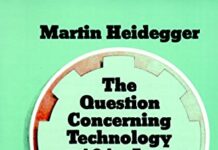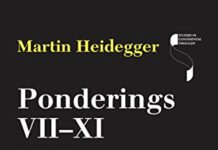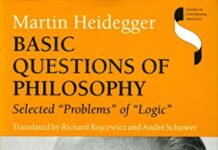
Ebook Info
- Published: 2012
- Number of pages: 456 pages
- Format: PDF
- File Size: 7.57 MB
- Authors: Martin Heidegger
Description
Martin Heidegger’s Contributions to Philosophy reflects his famous philosophical “turning.” In this work, Heidegger returns to the question of being from its inception in Being and Time to a new questioning of being as event. Heidegger opens up the essential dimensions of his thinking on the historicality of being that underlies all of his later writings. Contributions was composed as a series of private ponderings that were not originally intended for publication. They are nonlinear and radically at odds with the traditional understanding of thinking. This translation presents Heidegger in plain and straightforward terms, allowing surer access to this new turn in Heidegger’s conception of being.
User’s Reviews
Editorial Reviews: Review “[This book is] an impressive achievement.”―Notre Dame Philosophical Reviews”Written during the dark years 1936-1938, these Contributions help us to make the transition from Heidegger’s masterpiece, Being and Time, to his later thinking. Some of the darkest pages Heidegger wrote are here, and also some of the most brilliant. The translation by Richard Rojcewicz and Daniela Vallega-Neu is judicious and inspired.”―David Farrell Krell, DePaul University”Contributions is among the most challenging works of our time: rigorous, it is also acrobatic in its leaps and logic; imaginative, it is nonetheless precise; intensely self-reflexive, it engages far-reaching questions. Its greatest challenge though is its language and the new vocabulary it forges. This new translation meets that challenge and so marks a real advance in our understanding of this impossible, yet indispensible book.”―Dennis J. Schmidt, The Pennsylvania State University”I had tried to study the Contributions before, but I found it impossible. Now, thanks to this new translation, I have access to what may turn out to be the most important philosophical work of our time.”―Bruce Ledewitz, Duquesne University Review I had tried to study the Contributions before, but I found it impossible. Now, thanks to this new translation, I have access to what may turn out to be the most important philosophical work of our time. — Bruce Ledewitz About the Author Richard Rojcewicz is Scholar-in-Residence in the Philosophy Department at DuquesneUniversity. He is author of The Gods and Technology: A Reading of Heidegger and translator of several volumes of Heidegger’s Gesamtausgabe, including Basic Concepts of Ancient Philosophy (IUP, 2008).Daniela Vallega-Neu teaches philosophy at the University of Oregon. She is author of Heidegger’s Contributions to Philosophy: An Introduction (IUP, 2004) and editor (with Charles E. Scott, Susan Schoenbohm, and Alejandro Vallega) of Companion to Heidegger’s Contributions to Philosophy (IUP, 2001). Read more
Reviews from Amazon users which were colected at the time this book was published on the website:
⭐Written a decade after the masterwork Being and Time, Contributions to Philosophy was Heidegger’s second major attempt to reflect on the meaning, or truth, of Being. While Being and Time approached the question of Being from the perspective of the human being in its everyday engagements with the world, here Heidegger shifts his attention away from the ontology of the human being and towards an analytic of beyng as the event of appropriation.To fully grasp this work, it is crucial to note Heidegger’s change in locution here from the metaphysical conception of “being” to a more primordial conception of “beyng”. These concepts refer to entirely different things with entirely different histories. In illuminating beyng as event, Heidegger rejects the metaphysical understanding of being as the Platonic form of beingness–the most universal and vague concept under which all beings (objects, particles) are subsumed. According to Heidegger, this has been the reigning manner of understanding Being since the time of the ancient Greeks, and it was out of this vulgar understanding that the sciences, with their preoccupation with beings and the advancement of technology, were born. Heidegger does not want to eliminate the metaphysical conception of being outright; rather, he wants to work to overcome it through a “new beginning” that will give priority to the basic question of the truth of beyng. Addressing the basic question will require a re-thinking of the “first beginning” that was initiated by the Greeks in their relegating being to mere beingness.In contrast to this ordinary and mundane conception of being, beyng can only be understood as the most unique and strange concept, the event Dasein finds itself mysteriously thrown into when it awakens to its being appropriated over to the cleared region of the “there”. The awakening to beyng can best be described not by wonder and curiosity, but rather by a sense of utter shock, wherein a sense of estrangement befalls Dasein. When Dasein leaps into questioning beyng, no longer does it ask about the nature of beings in accordance with the guiding question of Western metaphysics began by Plato. Instead, what is inquired into is the event of appropriation, whose immense mystery ceaselessly conceals itself, while at the same time revealing beings as entities to dominate through calculation and manipulation. Throughout the past two millennia, beyng has succeeded in hiding itself while bringing beings to the forefront of Dasein’s dealings. Heidegger believes philosophy must no longer inquire into beings as such if it wants to progress, as would those in the sciences. It must meditate on the event of appropriation in its overwhelming occurrence.To accomplish the task of thinking the truth of beyng, Contributions takes a complete reversal in thought from that of Being and Time; while Dasein maintains a strong presence in this work, it is only insofar as Heidegger intends to speak the truth of the “Da,”, or “there,” of Da-sein–the appropriating event that calls on Dasein to ground the truth of beyng out of the needfulness of the gods. It is in the cleared region of the event that beyng essentially occurs as the “between” of the encounter between gods and the human, a realm of strife where the refusal of the gods, and the withdrawal of beyng from beings, can first be discerned. In the modern age, Dasein discovers itself in the plight of the abandonment by beyng, where life has lost its greater meaning, and humanity risks succumbing to nihilism. The greatest plight of the modern man is precisely a lack of a sense of plight in its ignorance of beyng as event. With Contributions, Heidegger intends to overcome the prevalent nihilism by provoking a return to the truth of beyng as grounded in Dasein.Many have described the tone of the numerous aphorisms contained in Contributions as dark and haunting. While this is not strictly inaccurate, it is also optimistic in its summoning for a new beginning to philosophy out of thinking toward the event, which bestows upon Dasein the cleared space where beings only then can reveal themselves as beings. With this book, Heidegger succeeds in bringing back that sense of awe and mystery behind the phenomenon of just “being there,” which scientific thinking is quickly removing from view and explaining away through findings in particle physics. After studying Being and Time along with this book, one is likely to discover that such reductionistic thinking comes up short when thinking moves into the question of the being of beings. Heidegger speaks on behalf of a domain of private experience that is very real, but remains unaddressed by the physical sciences in their disregard for the phenomenological significance of the human essence.I would love to give Contributions five stars, but there are several problems preventing me from doing so. It sorely lacks the organization and fluidity accomplished beautifully in Being and Time, and also leaves obscure many central concepts. For example, Heidegger often discusses beyng as the field of strife between “earth and world”, of “gods and humans”, but he does little to elucidate what is meant by this. As a result, the book often reads more like private journal entries than a work intended for a public audience.With that said, I do not think the basic premises of this work are impossible to understand, so long as one is prepared to slowly meditate on the ideas set forth and think simply and intuitively. Even if the details are fuzzy, Heidegger’s position has a wonderful coherence that philosophers too often fail to achieve. It is clear Heidegger has a rigid vision that he takes pains to get across here without altering his views midway through, but the struggle is saying something through language that transcends representation by words. I have not read the German for comparison, but this new translation seems to be a clear and precise rendering of the original text.
⭐The first English translation of Heidegger’s Beitraege was a complete disaster as a general reading experience, though worthwhile as a reference to how you might translate certain passages if you wanted to radicalize or push the target language. The second English translation of Beitraege by Rojcewicz and Vallega-Neu is much better as an overall reading experience, but it sometimes fails to get at the richness of Heidegger’s vocabulary. Grundstimmung as “basic disposition,” really? Ahnung as “presentiment”? Both of these English equivalents are rather too abstract and lead us away from what Heidegger had in mind. Heidegger’s vocabulary calls attention to itself in this and related texts as poetic words that are complex. Whereas the old translation tried its hand at strange neologisms and turns of phrase in order to get at this aspect of the text, the new translation covers over the original, as if to “forget” it in the Heideggerian sense. I wouldn’t have minded the normalizing of the text, if it had been accompanied by a proper apparatus of notes on a facing page that would give one the German word or phrase and its various meanings and intertexts (to other writings). If you look at the German/English vocabulary list at the end, it’s clear that complex words like Versagung aren’t delved into, as ‘withholding’ would be only one among a number of possible translations for it. Of course, the translators are aware of the possibilities; however, one suspects a reluctance to dwell on them in the interests of simplifying and standardizing. When they offer transition as the English equivalent to Uebergang, you know that something is being “lost in translation.” Fine, if that’s what’s needed for easier comprehension overall. But let’s have a note on what’s being lost, please. Publishers hate it, but in the case of such a book, you need a lot of apparatus, including the German original given in brackets within the text so that one can track how keywords are being conveyed in the target language. Emad and Maly went a bit overboard in their translation, to be sure, but they were on the right track in terms of trying to get at the linguistic senses that Heidegger was after, for example, by way of his exploitation of word families and their stems in German that displayed a certain sort of gathering/happening. Yes, Heidegger was trying to get language to “happen,” which that first translation appears to have noticed [hence “en-owning”] and that this new translation abandons as a realistic option for a rendering into English. Well, Rojcewicz and Vallega-Neu may be right. Maybe this is an alpine peak that can’t be conquered. English simply isn’t cognate enough with German. But I wonder if more can’t be done to halve the difference with Emad/Maly, to spin the text a little more in their direction without losing readability.
⭐Is our civilization star-crossed? Nearly impossible, it would seem, is the task of some kind of articulation of this crux that would be persuasive enough to even raise a question for most of us, busy, as we are, doing this or that. And Derrida did give us a text on the apocalyptic tone of modern philosophy inquiring as to the reasons for this tone. I will not minimize the difficulties of this book, but the questions it asks are, so I think, important and difficult in themselves. It is hard enough for anyone to ask of themselves what does it mean to be, or more simply, what is the sense and aim of our life. I do use the singular “life” as when Dante says in the first line of the Inferno “I found myself lost in the middle of `nostra vita’ ” But to ask beyond that question what does it mean to be at all carries us to a quest few could make even if it were the indispensible step for living authentically the sense and aim of our existence.The translation is clear, avoiding the jargon that can accrue to many texts that bend to the philosophical. But this does not mean careful weighing of the language can be avoided. Reading it in a meditative mode is best and perhaps easiest. I think starting in the middle of the book and reading it at random as the interest draws your attention may be a good way to read this book.So this would seem our author offers to us without, however, suggesting there is anything truly special about our author.I do not think there are any wise folk or gurus around here telling us what to think and do–just questioners.
⭐un livre fondamental : la traduction est la meilleure des traductions existantes dans plusieurs langues. Un très bon achat: le livre se présente bien à l’état, le papier est bon et la couverture impeccable.
⭐
Keywords
Free Download Contributions to Philosophy (Of the Event) (Studies in Continental Thought) in PDF format
Contributions to Philosophy (Of the Event) (Studies in Continental Thought) PDF Free Download
Download Contributions to Philosophy (Of the Event) (Studies in Continental Thought) 2012 PDF Free
Contributions to Philosophy (Of the Event) (Studies in Continental Thought) 2012 PDF Free Download
Download Contributions to Philosophy (Of the Event) (Studies in Continental Thought) PDF
Free Download Ebook Contributions to Philosophy (Of the Event) (Studies in Continental Thought)




